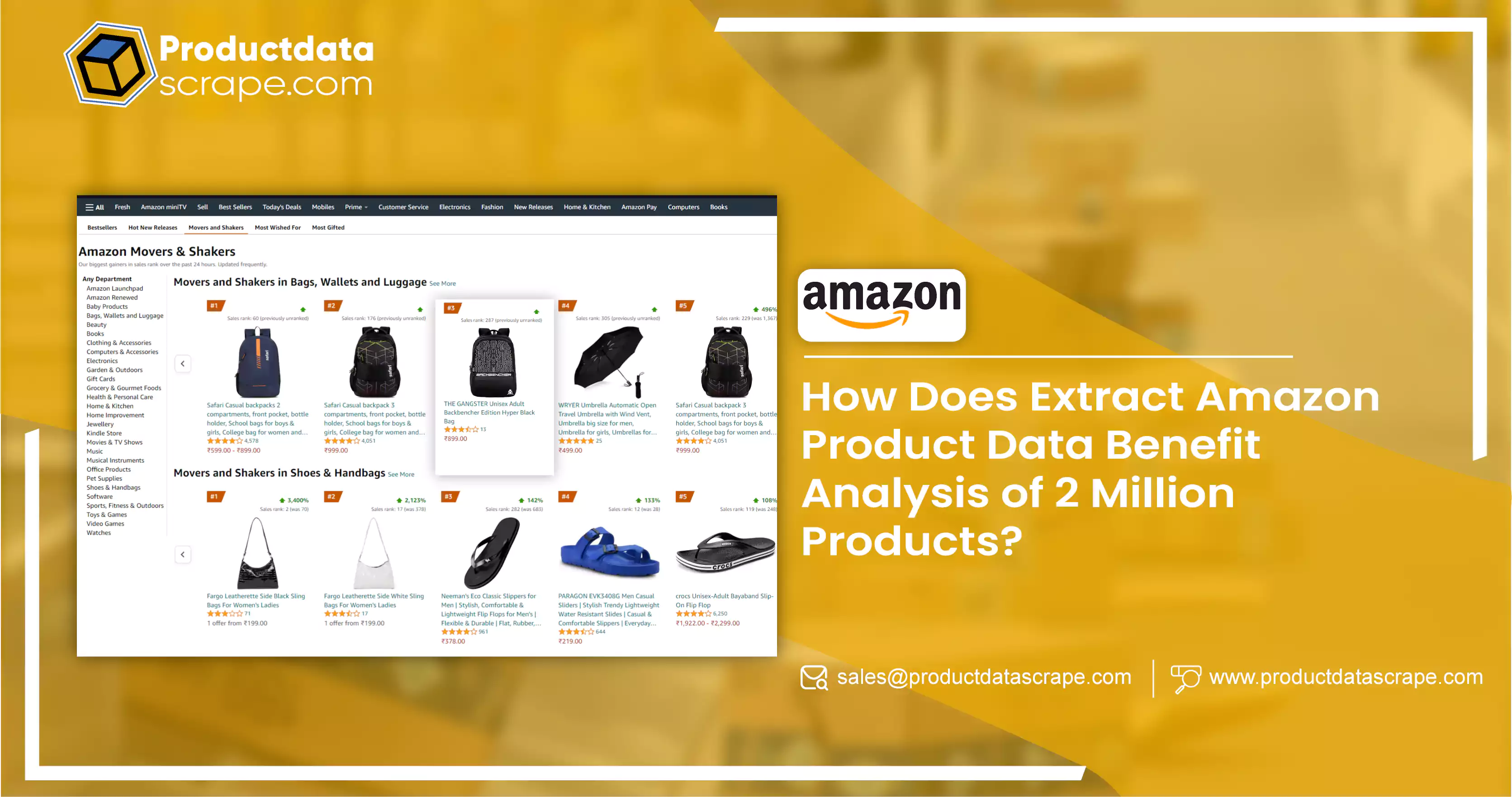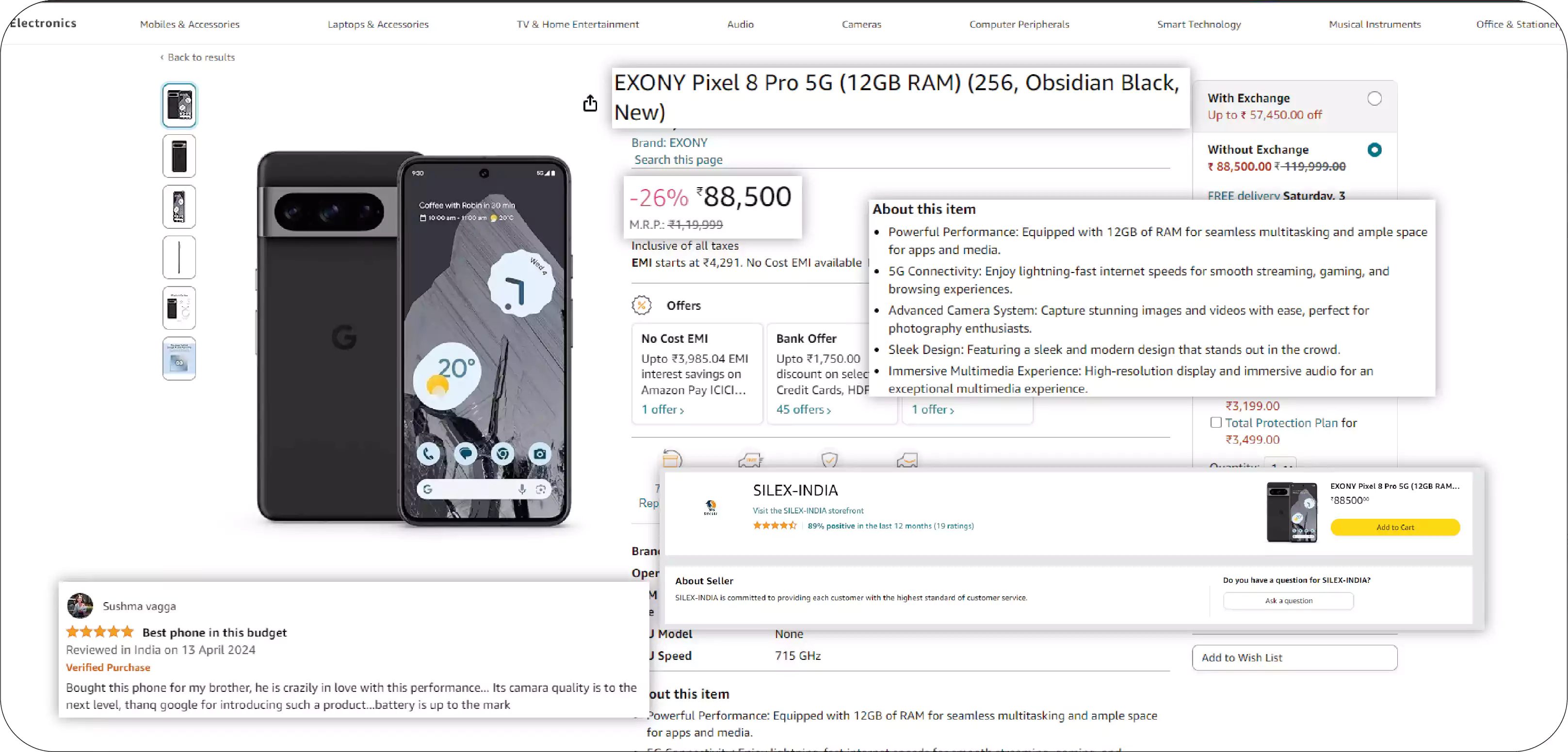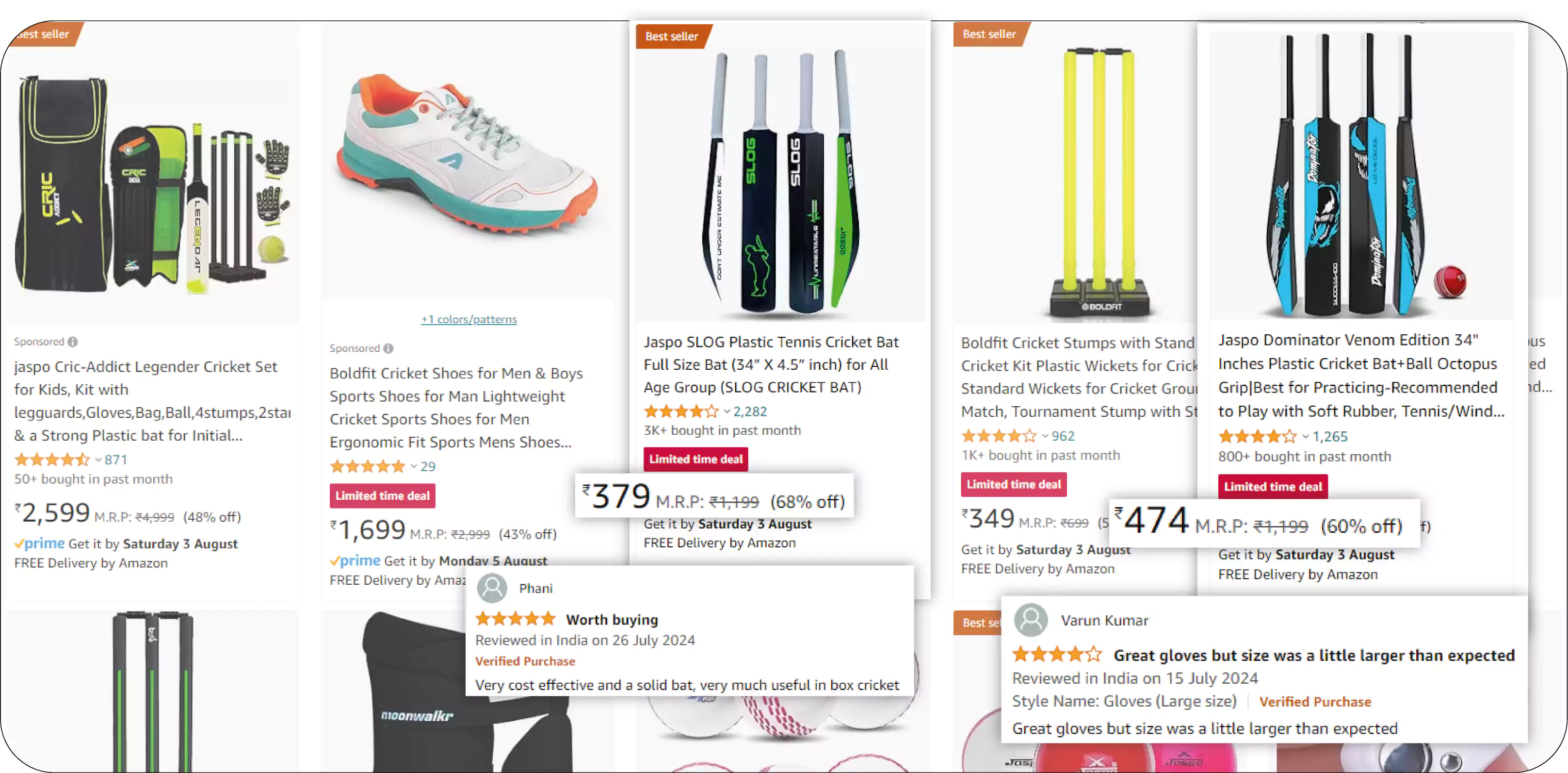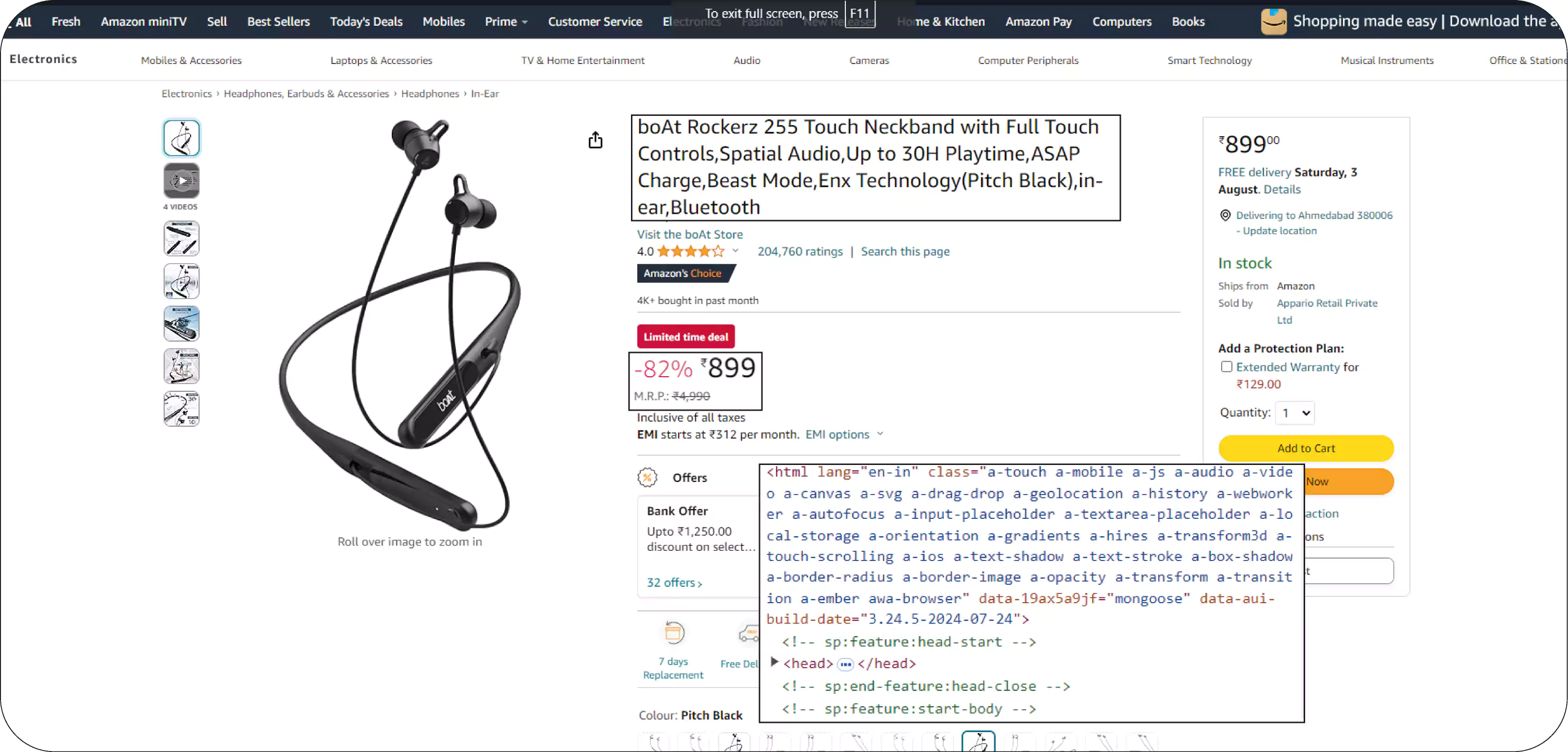
E-commerce data scraping has become indispensable across various sectors, offering businesses valuable insights into market dynamics and consumer behavior. Scraping data from Amazon., with its extensive catalog spanning millions of products across diverse categories, provides information crucial for strategic decision-making.
Businesses gain a comprehensive understanding of market trends and competitive landscapes by systematically extracting product details, pricing trends, customer reviews, and seller information. This data enables them to optimize pricing strategies, track competitor movements, and quickly identify emerging market trends. For instance, Amazon data extraction for 2 million products allows businesses to conduct thorough market analysis, uncovering patterns that drive effective inventory management and targeted marketing efforts.
However, ethical considerations and compliance with data privacy regulations are paramount in e-commerce data scraping. Respecting platform terms of service and user rights ensures transparency and trustworthiness, which are essential for sustaining long-term business relationships and legal integrity in data-driven endeavors.
Types of data collected from Amazon.in

Several types of data can be collected through scraping Amazon listings, providing valuable insights for businesses and researchers:
Product Details, including titles, descriptions, specifications, and images, are crucial for understanding each product's features and attributes.
- Pricing Information: Current prices, discounts, and historical pricing trends enable businesses to optimize pricing strategies and monitor competitive dynamics.
- Customer Reviews and Ratings: Feedback from buyers regarding product satisfaction, quality, and service, offering insights into consumer sentiment and product performance.
- Seller Information: Details about sellers, including ratings, shipping options, and fulfillment methods, are essential for evaluating seller reliability and competitiveness.
- Sales Rank and Best Sellers: Rankings and popularity metrics indicating product demand and market trends within specific categories.
- Product Availability: Inventory status, including stock levels and availability dates, is crucial for managing supply chain operations and forecasting demand.
- Product Categories and Attributes: Categorization data, helping businesses understand product segmentation and consumer preferences across different categories.
- Promotional Data: Information on discounts, promotions, and deals, aiding in assessing marketing strategies and consumer behavior during sales events.
- Shipping and Delivery Details: Information related to shipping costs, delivery options, and estimated delivery times influencing customer purchasing decisions.
- Search Trends and Keywords: Popular search terms and trends, guiding businesses in optimizing product listings and enhancing visibility on the platform.
Collecting and analyzing these diverse Amazon datasets allows businesses to gain actionable insights, improve decision-making processes, and enhance overall competitiveness in the e-commerce marketplace.
Why do businesses Choose Amazon web scraping services to Collect Product Data?

Businesses choose Amazon web scraping services to gain competitive advantages through comprehensive product data insights, pricing strategies optimization, and enhanced understanding of consumer behavior for strategic decision-making.
Comprehensive Market Insights: Amazon product data scraping service provides businesses with comprehensive data on product listings, pricing trends, and competitor strategies, crucial for informed market analysis.
Competitive Analysis: Using Amazon competitor analysis scraping, businesses can monitor competitor pricing, promotions, and product launches in real-time, enabling strategic adjustments to stay competitive.
Consumer Behavior Insights: Accessing customer reviews, ratings, and buying patterns allows businesses to understand consumer preferences and sentiment, guiding product development and marketing strategies.
Optimized Pricing Strategies: Real-time data on pricing fluctuations and historical trends, obtained through price scraping for Amazon products, help businesses adjust pricing strategies dynamically to maximize profitability and market share.
Inventory Management: Amazon market research scraping provides visibility into product availability, stock levels, and demand forecasts, facilitating efficient inventory management and reducing stockouts.
Enhanced Product Catalog: By scraping product details and attributes, businesses can enrich their catalogs with accurate and up-to-date information, improving customer satisfaction and retention.
Marketing Campaign Optimization: Web scraping for Amazon analytics provides insights into popular products, search trends, and promotional activities, enabling businesses to tailor marketing campaigns effectively and reach targeted audiences with precision.
Strategic Decision-Making: Automated Amazon data scraping supports data-driven decision-making processes, guiding business expansion, product diversification, and operational efficiencies based on market trends and consumer behavior.
How Does Amazon Data Scraping API Benefit Business?

Amazon data scraping APIs can provide significant business benefits by enabling companies to gather real-time market intelligence, monitor competitor pricing strategies, and track product trends effectively. These APIs allow businesses to access and analyze vast amounts of data from Amazon's platform swiftly and efficiently. By leveraging such tools, companies can optimize their pricing strategies, identify emerging market trends, and make informed inventory management and product development decisions.
Moreover, Amazon data scraping tools empower businesses to enhance their competitive positioning by gaining insights into customer preferences and behaviors. This information can be used to tailor marketing campaigns, improve customer engagement, and personalize the shopping experience. Additionally, these APIs enable businesses to monitor product reviews and sentiment analysis, helping them understand consumer sentiment and adapt their strategies accordingly.
Overall, web scraping Amazon products streamline data acquisition processes, reduce manual effort, and provide actionable insights that drive business growth and profitability. However, businesses must adhere to legal and ethical guidelines while using these APIs to ensure compliance with Amazon's terms of service and data usage policies.
Conclusion: Web scraping solutions for Amazon offer businesses powerful tools to gather, analyze, and leverage critical data for strategic decision-making. These solutions enable companies to gain competitive advantages by accessing real-time market information, monitoring competitor activities, and understanding consumer trends more comprehensively. By automating Amazon product catalog scraping and analysis processes, businesses can save time and resources while improving operational efficiency and agility. However, organizations must implement these solutions responsibly, ensuring compliance with legal regulations and ethical standards. With proper utilization, Amazon inventory scraping empowers businesses to optimize their strategies and fosters innovation and growth in an increasingly competitive digital landscape.
At Product Data Scrape, ethical principles are central to our operations. Whether it's Competitor Price Monitoring Services or Mobile App Data Scraping, transparency and integrity define our approach. With offices spanning multiple locations, we offer customized solutions, striving to surpass client expectations and foster success in data analytics.



































.webp)






